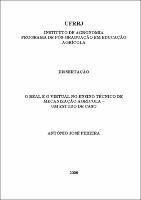Please use this identifier to cite or link to this item:
https://rima.ufrrj.br/jspui/handle/20.500.14407/12433| Tipo do documento: | Dissertação |
| Title: | O real e o virtual no ensino técnico de mecanização agrícola - um estudo de caso |
| Other Titles: | The real and virtual in tecnical education of agricultural mechanization - a case study |
| Authors: | Pereira, Antônio José |
| Orientador(a): | Santana, Gilson Candido |
| Keywords: | Educação Agrícola;evolução tecnológica;equipamentos agrícolas;professor;ensino-agrotécnico;ferramentas de ensino;Agricultural education;technological evolution;agricultural implements;professor;education tools |
| Área(s) do CNPq: | Educação |
| Idioma: | por |
| Issue Date: | 30-Sep-2008 |
| Publisher: | Universidade Federal Rural do Rio de Janeiro |
| Sigla da instituição: | UFRRJ |
| Departamento: | Instituto de Agronomia |
| Programa: | Programa de Pós-Graduação em Educação Agrícola |
| Citation: | PEREIRA, Antônio José. O real e o virtual no ensino técnico de mecanização agrícola - um estudo de caso. 2008. 87 f. Dissertação (Mestrado em Educação Agrícola) - Instituto de Agronomia, Universidade Federal Rural do Rio de Janeiro, Seropédica - RJ, 2008. |
| Abstract: | A evolução tecnológica dos tratores e implementos agrícolas estabelece um desafio à formação dos profissionais que farão uso desta tecnologia. É imperativo que o ensino de mecanização agrícola nas escolas técnicas oportunize ao educando ampla gama de informações sobre os tratores e implementos, capacitando-o a utilizar adequadamente aqueles disponíveis no mercado onde atuará. Esta pesquisa foi realizada no Colégio Agrícola de Camboriú (CAC) com duas turmas de alunos do curso Técnico em Agropecuária da modalidade pós-ensino médio. O conteúdo sobre semeadoras-adubadoras da disciplina de Mecanização Agrícola foi ministrado de duas formas, pelo professor/pesquisador. Para uma turma, o conteúdo foi ministrado através do computador, com o acesso a um software sobre a semeadora-adubadora modelo 1013 da Fankhauser, contendo também informações sobre outras semeadoras-adubadoras, elaborado pelo professor/pesquisador com a colaboração de alunos e professores do curso Técnico em Informática do CAC. Para a outra turma o conteúdo foi ministrado da forma tradicional, com aulas teóricas em sala de aula e em torno da máquina. As atividades práticas programadas foram realizadas igualmente em ambas as turmas. Caracterizada como um estudo de caso, esta pesquisa comparou o grau de aprendizagem obtido pelas duas turmas, sendo comum a ambas o acompanhamento e orientações do professor. Os resultados obtidos mostraram que não houve diferença significativa de aprendizado nas duas turmas estudadas e que a presença e orientação do professor são fundamentais para o processo de ensino-aprendizagem em ambas as situações, demonstrando ser possível manter a formação do profissional paralela à evolução tecnológica dos equipamentos utilizados na agricultura moderna, adequando as ferramentas de ensino. |
| Abstract: | The technological evolution of the tractors and agricultural implements establishes a challenge to the formation of the professionals who will make use of this technology. It is imperative that the education of agricultural mechanization in the schools techniques give the opportunity to students in acquiring a lot of information on the tractors and implements, enabling them to use it adequately, mainly those available in the market nowadays. This research was carried through in the Agricultural College of Camboriú (CAC) with two groups of students from the Technician in Farming Course after high school level. The content on top dressing machines-sowing machines of the agricultural mechanization disciplines was given in two forms, by the professor/researcher. For a group the content was given through a computer, with the access to software on top dressing machine-sowing machine model 1013 of the Fankhauser, also have information on others top dressing machine-sowing machine, elaborated by the professor/researcher with the contribution of students and professors from Technician in Computer science Course of the CAC. For the other group the content was given in a traditional form, with theoretical lessons in classroom and around the machine. The programmed practical activities had been equally carried through in both groups. Characterized as a case study, this research compared the degree of learning obtained from two groups, being common to both the accompaniment and the orientation of the professor. The obtained results had shown that it did not have significant difference of learning in the two studied groups and that the presence and orientation of the professor are basic for the process of teach-learning in both situations, demonstrating to be possible to keep the formation of the professional in parallel the technological evolution of the equipment used in modern agriculture, adjusting the education tools. |
| URI: | https://rima.ufrrj.br/jspui/handle/20.500.14407/12433 |
| Appears in Collections: | Mestrado em Educação Agrícola |
Se for cadastrado no RIMA, poderá receber informações por email.
Se ainda não tem uma conta, cadastre-se aqui!
Files in This Item:
| File | Description | Size | Format | |
|---|---|---|---|---|
| 2008 - Antônio José Pereira.pdf | 2.77 MB | Adobe PDF |  View/Open |
Items in DSpace are protected by copyright, with all rights reserved, unless otherwise indicated.

